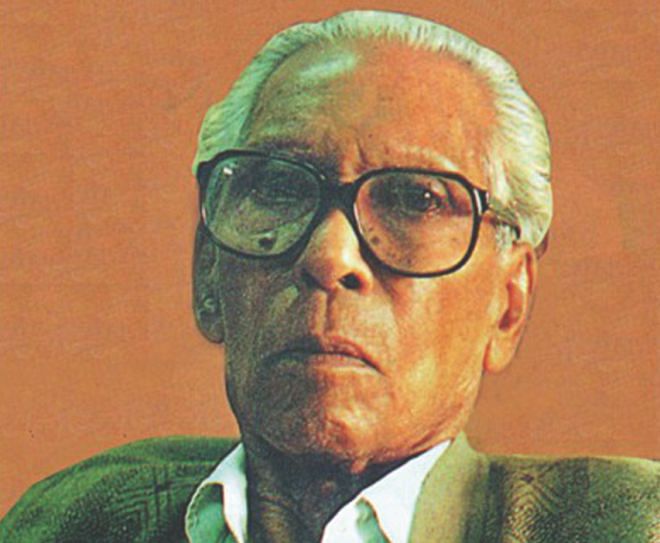Spirit of Ekushey
Spirit of Ekushey
The music that gave it grandeur…

Years ago, prominent cultural figures hailing from Barisal, were invited over for the centennial celebrations of Brojo Mohon College, popularly known as BM College. The ship was to set sail in the evening and we hurried to the Sadarghat terminal.
Everyone seemed in a jovial mood. Veteran singer and composer Abdul Latif; noted singer Papya Sarwar; illusionist Jewel Aich; noted actors Khairul Alam Shobuj, KS Firoze; media personality Nawazish Ali Khan; singer Latifa Helen and myself could barely conceal our excitement as we boarded the ship. Chandradwip, an organisation of Barisal, had arranged this memorable programme. That trip now seems all the more significant as this was the last time I had the opportunity to interact with Abdul Latif, whom we affectionately called “Latif bhai.”
Sometime around the '60s, then president of Pakistan, Ayub Khan, was to visit the Dhaka radio station at Shahbagh. Massive preparations were underway to put up an impressive show. As the youngest group at the station, we were preparing for a live performance and were training under eminent composers Abdul Ahad, Samar Das and Abdul Latif.
The ever-buoyant Latif bhai would teach us rhymes and spiritual songs.
On weekends we would flock together at the big studio no. 6 at Shahbagh.
The spirited Latif bhai was a wizard when it came to children's songs. Latif bhai in his white pyjama-panjabi, a cigarette at the corner of his mouth, riding his Vespa to work, was a familiar sight.
His on-stage performances never failed to captivate us. He sang as he spoke
--with a booming voice, and in high spirits. His varied tunes always had a touch of the folk element. He was also a master in 'puthi paath,' the traditional art of reciting folklore--hardly heard nowadays.
He had the amazing ability to write lyrics and compose tunes at a moment's notice. The story goes that one of his timeless songs was written in a similar fashion. While on his way to office he had a sudden inspiration to write a song on the Language Movement. He hurriedly came back home. On a piece of paper, he scribbled the words, “Ora amaar mukher kotha kaira nitey chaye.” This was in the year 1952. The song was soon on everyone's lips, the message of the song forthright and strong.
Acclaimed singer Abdul Alim's most popular numbers “Duarey aishachhey palki,” “Por-er jaiga por-er jomin,” and many more folk numbers were composed by Abdul Latif. He had composed over 1500 songs in total.
The iconic Ekushey song, “Amar bhaiyer rokte rangano”, written by Abdul Gaffar Chowdhury, was initially set to music by him. Later, however, Altaf Mahmood's tune was adapted and the song became the popular number it remains to this day.
At the height of the 1969 Mass Movement, Abdul Latif renounced the “Tamgha” title given by the Pakistan government. He was honoured with Ekushey Padak in 1979 and the Swadhinata Padak in 2002.
In more ways than one, Abdul Latif remains for us an embodiment of the spirit of Ekushey.
Ekushey itself is of course the culmination of a month-long programme. Artistes would gather, as they gather nowadays, at the altar every evening with poems, skits, drama and songs.
The first song of Ekushey composed by Mosharrafuddin Ahmed on February 24, 1952, Mrittuke jara tuchcho korilo bhasha bachabar torey; Abdul Latif's Ora amar mukher kotha kaira nitey chaye, composed in 1952; Bhulbona shei Ekushey February bhulbona written spontaneously by Language Movement veteran Gaziul Haque in 1952; Himalay thekey Shundorbon hothath Bangladesh by Sukanta Bhattacharya; Phul khelbar din noi oddo by Subash Mukhopadhyay; Jonotar shongram cholbei by Sikandar Abu Zafar; were amongst the brilliant compositions by Sheikh Luthfur Rahman, which to our misfortune, are sadly by and
large unheard nowadays.
The call of history for us is simple. This nation needs to travel back to its heritage as exemplified by Abdul Latif and all those illustrious men, who instilled patriotism in us through the arts, injected vibrancy into our celebrations of the Ekushey spirit. Culture is all. A nation is everything with it, for culture lights up a path through the dense woods. Without culture, it is always primitivism which keeps individuals from flowering into purposeful societies